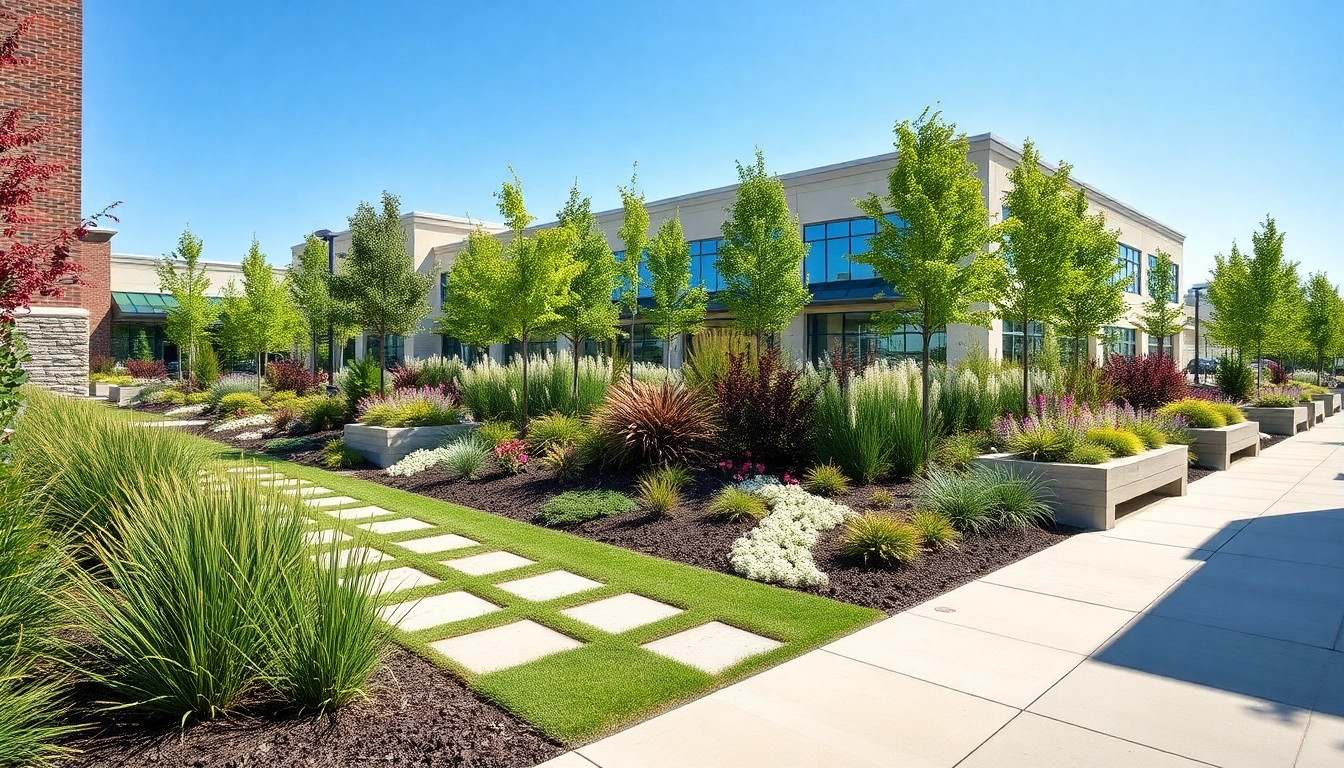Understanding the Role of Commercial Landscaping Contractors
Commercial landscaping contractors play a crucial role in maintaining and enhancing the outdoor spaces of businesses and institutions. Unlike residential landscaping, which focuses on private homes, commercial landscaping contractors provide services to corporate offices, shopping centers, parks, and various commercial properties. Their expertise not only beautifies spaces but also ensures functionality, sustainability, and compliance with local regulations.
What Services Do They Offer?
Commercial landscaping encompasses a broad range of services that are tailored to the specific needs of a business’s outdoor environment. These services typically include:
- Landscape Design: Creating aesthetic and functional outdoor spaces that align with the business’s brand image.
- Landscape Maintenance: Regular upkeep such as mowing, trimming, fertilization, and pest control to maintain a healthy and attractive landscape.
- Irrigation Systems: Installation and maintenance of efficient irrigation systems to conserve water and ensure proper hydration for plants.
- Hardscaping: The construction of non-plant elements like patios, walkways, and retaining walls that add structure to the landscape.
- Seasonal Displays: Design and installation of seasonal floral arrangements or decorations to enhance curb appeal throughout the year.
- Tree Care: Professional assessment and maintenance of trees to promote health and longevity, including pruning and removal.
Importance for Different Industries
The necessity for commercial landscaping contractors varies across industries. In the corporate sector, well-maintained grounds can enhance employee morale and impress clients, whereas in retail, attractive landscaping draws customers and increases foot traffic. Specific industries such as hospitality, healthcare, and education rely heavily on stunning outdoor spaces to create welcoming environments. For example, hotels may invest in elaborate gardens, while schools might focus on safe play areas for children. Each setting requires tailored approaches to landscaping that consider both functionality and aesthetic appeal.
How to Assess a Contractor’s Capabilities?
Choosing the right commercial landscaping contractor is pivotal. Here are essential steps to gauge their capabilities:
- Check Credentials: Verify their licenses, certifications, and insurance to ensure they are qualified to handle your landscaping needs.
- Examine Previous Work: Request a portfolio or examples of past projects. Look for diversity in design and execution that fits your vision.
- Read Reviews and References: Customer testimonials provide insight into the contractor’s reliability and quality of work. Speak directly to past clients if possible.
Key Factors to Consider When Hiring
Budgeting for Commercial Landscaping Projects
Understanding costs is crucial to budgeting for landscaping projects. Costs can vary widely based on project scope, landscape design complexity, and local labor rates. On average, commercial landscaping costs may range from $2 to $10 per square foot. Therefore, establishing a realistic budget needs to account for:
- Design and planning fees
- Materials and plants
- Labor costs
- Ongoing maintenance expenses
Evaluating Experience and Reputation
Experience matters significantly when hiring a landscaping contractor. Seek contractors with a proven track record in your industry. Their familiarity with specific regulations, plant types, and environmental conditions will influence the quality and effectiveness of the landscaping. Ask for case studies or examples of similar projects they have successfully completed in the past to gauge their competence.
Understanding Design and Maintenance Agreements
Before finalizing a contractor, ensure that you understand the terms of any design and maintenance agreements. Discuss the following:
- The scope of work included in the contract
- Payment schedules and conditions for change orders
- Service guarantees and warranties for plant health
- Flexibility for seasonal adjustments or corrections
Common Challenges Faced by Commercial Landscaping Contractors
Seasonal Considerations and Planning
Landscaping contractors often face challenges related to seasonal weather variations. For instance, adapting services to seasonal changes requires careful planning. In colder climates, landscape design must consider winter harshness, using materials that can withstand snow and ice while ensuring plant selection is appropriate for all seasons. Planning becomes essential so that contractors can adjust their services throughout the year, maintaining the landscape’s appeal while managing costs effectively.
Addressing Environmental Sustainability
More businesses are leaning towards sustainable practices, expecting their landscaping contractors to do the same. This involves:
- Utilizing native plants that require less water and maintenance
- Implementing efficient irrigation systems to reduce water waste
- Incorporating environmentally-friendly practices like organic fertilization and pest control
Contractors must stay updated on industry best practices and innovations that promote sustainability to meet clients’ growing expectations.
Managing Client Expectations
Clients often have high expectations regarding timelines, budget, and overall results. To manage these effectively, contractors should establish clear communication from the start. Setting realistic timelines and budgets while keeping clients informed about project progress and any potential challenges is key to maintaining trust and satisfaction.
How to Find Reliable Commercial Landscaping Contractors
Leveraging Online Reviews and Testimonials
In today’s digital age, online reviews are a vital resource for evaluating potential contractors. Websites like Yelp and Google Reviews provide insight into the contractor’s reliability, quality of work, and customer satisfaction. Look for contractors with consistently high ratings and read through reviews to identify recurring themes regarding their performance.
Networking and Referrals for Better Choices
Networking within your industry can enhance your search for reputable landscaping contractors. Attending industry events, trade shows, or even local business events allows for firsthand recommendations. Referrals from other businesses can also provide confidence in choosing a contractor who has already impressed in your network.
Utilizing Social Media for Research
Social media platforms like Facebook, Instagram, and LinkedIn can be valuable tools for researching landscaping contractors. Following their profiles allows you to view past work, customer interactions, and even discover client reviews. A contractor that actively engages with their customers through social media is likely invested in their brand and customer satisfaction.
Measuring Success in Commercial Landscaping Projects
Evaluating Results and Performance Metrics
Once a landscaping project is completed, evaluating success is crucial. Consider the following metrics:
- Aesthetic Appeal: Does the landscaping meet the initial design intent and client expectations?
- Functional Use: Are outdoor areas utilized effectively for events, client interactions, or employee engagement?
- Sustainability: Are eco-friendly practices in place, and do plants thrive in their environment?
Long-Term Maintenance Strategies
Sustaining the attractiveness and health of the landscape requires a solid maintenance strategy. Routine care, regular assessments, and seasonal adjustments are critical. A well-structured maintenance program can include:
- Scheduled inspections for plant health
- Timely pruning of trees and shrubs
- Replacement or replenishment of seasonal plants and flowers
Client Feedback and Relationship Building
Soliciting client feedback post-project allows contractors to understand satisfaction levels and areas for improvement. Establishing a strong relationship through consistent follow-up drives repeat business and referrals. Contractors exhibiting responsiveness to feedback demonstrate a commitment to quality service that clients will value and advocate.















Leave a Reply